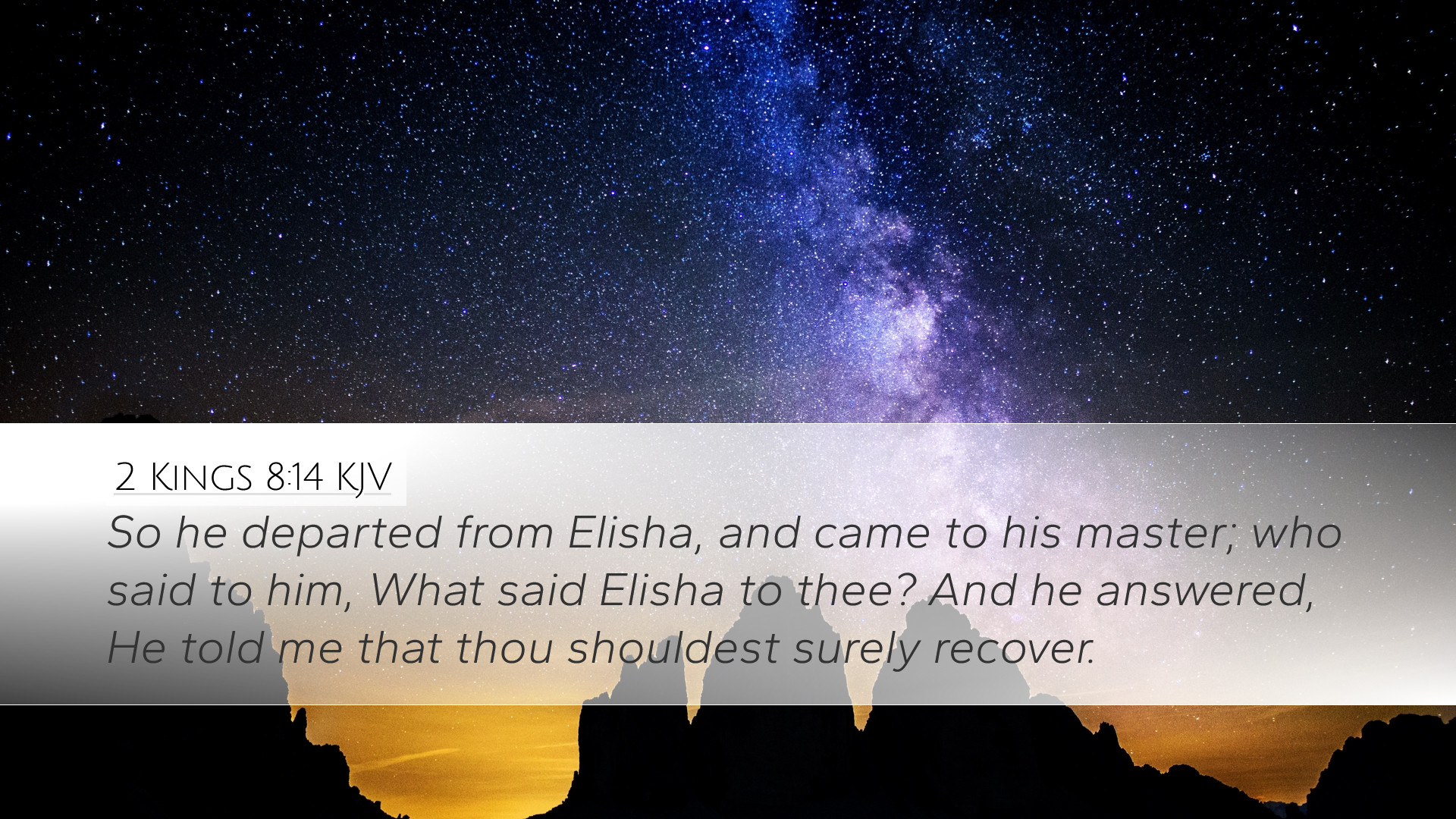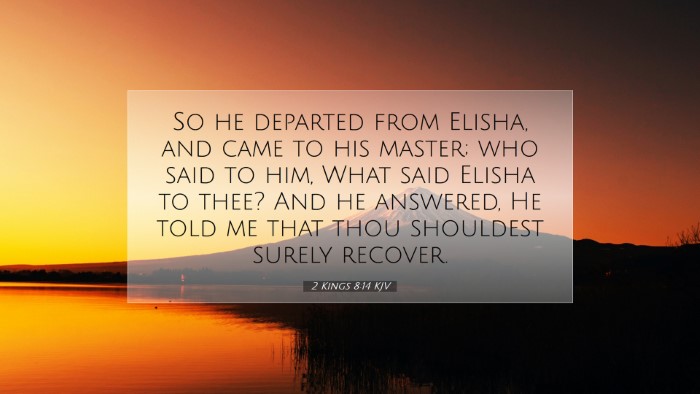Commentary on 2 Kings 8:14
2 Kings 8:14 states: "So he went in and stood before his master. And he said to him, 'Thus says the LORD: "Shall I not be a king?"'" This verse presents a pivotal moment in understanding the dynamics of power, prophecy, and the human heart which is of paramount importance for pastors, students, theologians, and Bible scholars seeking to grasp the text's deeper implications.
Contextual Overview
This verse occurs within a larger narrative concerning the interactions between the kingdoms of Israel and Judah during a turbulent time marked by political intrigue and prophetic activity. The passage invites an examination of the historical figures involved, especially focusing on the prophetic role of Elisha in relation to Jehoram, king of Israel.
Insights from Matthew Henry
Matthew Henry's commentary emphasizes the grave nature of the transition from the prophetic to the political realm. Henry notes that Elisha, as a man of God, fulfills his role with a sense of divine purpose, delivering messages that challenge the status quo.
- The Seriousness of Divine Communication: Henry underscores the solemnity with which Elisha approaches King Jehoram. The prophetic word is not mere advice; it is a directive from the Lord, carrying weighty implications.
- Human Ambition: Henry discerns the interplay between divine will and human ambition, suggesting that the desire to ascend to power often puts individuals at odds with God's intentions.
- Faithfulness in Prophecy: By standing before the king, Elisha exemplifies the boldness required of prophets, representing divine truth even in hostile environments.
Insights from Albert Barnes
Albert Barnes offers a theological reflection on the nature of authority as depicted in this verse. His commentary posits several critical observations regarding the political landscape and its theological implications.
- Divine Sovereignty: Barnes emphasizes that despite the seeming chaos in leadership, God's sovereignty remains intact. The statement "Thus says the LORD" serves as a reminder that God orchestrates the affairs of men according to His divine plan.
- Significance of the Counseled Actions: The actions taken by characters in this narrative reflect broader themes of betrayal and loyalty, underlining that God utilizes even the flawed human choices to accomplish His purposes.
- The Role of Prophets: Barnes highlights the function of prophets within Israelite society, noting that they serve as intermediaries who speak divine truth, drawing attention to the moral responsibilities of leadership and the consequences of divine disfavor.
Insights from Adam Clarke
Adam Clarke provides a detailed analysis of the socio-political implications, focusing on the implications of the phrase "Shall I not be a king?". This line draws forth the ambitions that characterize the political actors in the narrative.
- Ambition and Destiny: Clarke discusses how personal ambition can lead individuals to seek power outside the divine will. The phrase is a reflection of Jehoram's political instability and aspirations that are not necessarily aligned with God's purpose.
- Prophetic Integrity: He emphasizes Elisha’s commitment to prophetic integrity, illustrating how the prophet must navigate the complexities of political machinations while remaining true to God's calling.
- Historical Context: Clarke situates the events within the historical context of Israel's monarchy, discussing how this moment signifies the turbulence and ultimate decline of the house of Ahab.
Theological Reflections
This passage offers significant theological insights into God's governance and the human condition. The role of prophets as mediators of divine truth raises questions about contemporary prophetic voices and their responsibilities in today’s society.
Human Ambition vs. Divine Purpose
The interplay of human ambition and divine purpose remains a relevant theme. Reflecting on Jehoram's desire to be king invites modern readers to consider the motivations behind aspirations for power and authority.
Prophetic Responsibility
The passage serves as a reminder of the prophetic responsibility to deliver messages that challenge and guide, regardless of popular opinion. This calls for boldness and clarity in contemporary ministry.
God's Sovereignty in Leadership
The assurance of God's sovereignty invites trust amidst political uncertainties. Believers are encouraged to remain steadfast in faith, understanding that God's will ultimately prevails.
Conclusion
2 Kings 8:14 is a verse rich in prophetic significance and moral complexity. The commentary combined from Matthew Henry, Albert Barnes, and Adam Clarke provides a multidimensional view, reinforcing the role of divine authority over human ambition, the implications of prophetic actions, and the inherent challenges that arise within political contexts. For pastors, scholars, and students, these insights continue to resonate with the unfolding narrative of faith and governance, inviting reflection on personal and communal responsibilities in the face of divine truth.


